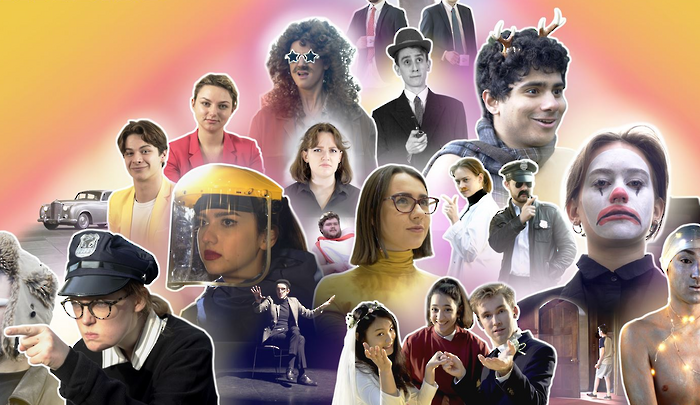The Dead Don’t Die but we’re all going to
Madeleine Pulman-Jones reflects on cops, zombie Iggy Pop, and our shared mortality

The Dead Don’t Die, the latest from art-house oddball Jim Jarmusch, is a zombie movie in the most literal sense. The Dead Don’t Die is not so much a movie about zombies, as a movie that is a zombie. Jarmusch indulges in the self-referential coolness of his star-studded cast with no less restraint than that with which his “dead that don’t die” gorge themselves on their famous flesh. Set in the fictional town of Centreville on the night of a zombie apocalypse, his film staggers from in-joke to in-joke, conceding pace to running gags which are unlikely to elicit more than a chuckle from even the most observant Jarmusch devotee. What pace is left in the film is sporadically punctuated by cop Ronnie Peterson’s (Adam Driver) exclamations that “this is going to end badly.” When pushed by fellow cop, Cliff Robertson (Bill Murray), Ronnie concedes that he knows how everything will end because he has “already read the script.” It would seem that such knowing fare from Jarmusch would have been enough to finally bore even me, self-proclaimed Jarmusch devotee, “to death” – and yet somehow it isn’t.
While Jarmusch claimed in a recent interview with i-D that he intended the film to be “entertaining comedy,” subtle and not-so-subtle references to Trump’s America, like his zombies, persistently rear their ugly heads. In a political climate so saturated in commentary that we sometimes feel as though we had “already read the script,” Jarmusch’s cinematic meander down small-town-America lane is far less frivolous than it might appear. Granted, scenes that show ecological pandemonium in the wake of “polar fracking,” and a racist townsman in a “keep America white again” cap being devoured by the undead might fall just to the wrong side of “pat on the back.” But this doesn’t stop the film from making an effective statement about political accountability. At the risk of reading too much into Jarmusch’s “entertaining comedy,” the rising of the dead in Centreville neatly mirrors the rise of troubling extremist views in what might have once been considered political “Centreville.”
Having built a career on thinking outside the box, Jarmusch has trouble getting himself out of the box he’s made for himself
Like its earlier companion piece Only Lovers Left Alive, The Dead Don’t Die is less a genre movie than a genre remix. Only Lovers Left Alive had an unfair advantage over The Dead Don’t Die. The already posturing vampire movie proved a match as perfect for Jarmusch’s eccentric arthouse as the lovers for one another, and the film managed to cater to both the discerning cinephile and the vampire enthusiast. Sadly, the marriage of pomp and pop seems to have posed a greater challenge for Jarmusch in The Dead Don’t Die. For all their seemingly aimless wandering, the key factor in the zombie movie is the chase, however menacingly leisurely its pace. Jarmusch does manage to maintain the ambience of the classic zombie-flic through camerawork and mise-en-scene alone, but his insistence on shooting the zombies only as they finally corner their victims robs the viewer of a truly satisfying zombie chase. Ultimately, none of this stops The Dead Don’t Die from being an enjoyable piece of summer cinema. For viewers unconcerned by the trappings of the genre, The Dead Don’t Die provides plenty of wacky entertainment, most impressively in the form of a coffee-obsessed zombie Iggy Pop, and a sword-wielding Scottish undertaker played by Tilda Swinton.
The Dead Don’t Die is quite the departure from 2017’s Paterson, a playful meditation on the New York School poets through the eyes of Adam Driver’s bus driver come bard, and yet its dizzying crossfades and dark humour will be familiar to fans of Only Lovers Left Alive and earlier features such as Stranger than Paradise and Mystery Train. Perhaps it is this very familiarity which deprives the film of its ultimate punch. Yes, the pace is slow, yes the tone indulgent, but these are merely the symptoms of an all too powerful sense of artistic comfort. Having built a cinematic oeuvre on thinking outside the box, Jarmusch seems to be having trouble getting himself out of the new box he’s made for himself. In The Dead Don’t Die, Jarmusch remodelled Tilda Swinton as Zelda Winston, both a visual and literal rhyme of her real-life self. In spite of all its fun, it’s difficult to see The Dead Don’t Die as anything more than that – the next in a sequence of rhymes that make up the poem of Jarmusch’s filmography.
For a film which seems to pride itself on its off-the-wall humour, The Dead Don’t Die leaves a bitter aftertaste. Whoever or whatever they may represent, the dead won’t die, but Jarmusch is keen to remind us that someday we all will.
 Comment / Cambridge’s tourism risks commodifying students18 April 2025
Comment / Cambridge’s tourism risks commodifying students18 April 2025 News / Varsity ChatGPT survey17 April 2025
News / Varsity ChatGPT survey17 April 2025 News / Cambridge researchers build tool to predict cancer treatment success19 April 2025
News / Cambridge researchers build tool to predict cancer treatment success19 April 2025 News / Cambridge researchers find ‘strongest evidence yet’ of life on distant exoplanet18 April 2025
News / Cambridge researchers find ‘strongest evidence yet’ of life on distant exoplanet18 April 2025 News / Greenwich House occupiers miss deadline to respond to University legal action15 April 2025
News / Greenwich House occupiers miss deadline to respond to University legal action15 April 2025






